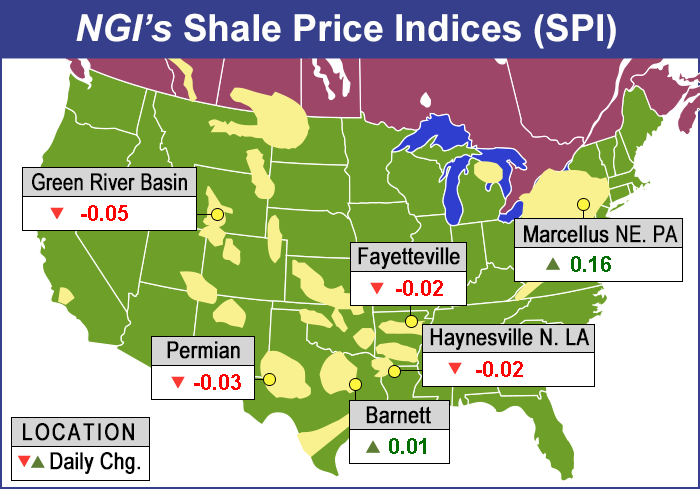- HOME
- DAILY GPI
- SHALE DAILY
- NGI
- DATA
- *NEW* Forward Look Price "Snapshot"
- Daily Price "Snapshot"
- Weekly Price "Snapshot"
- Bidweek Price "Snapshot"
- Bidweek Alert Data
- Shale Gas Prices (subscriber-only)
- Price Data "Learn More"
- > NGI Price Methodology (pdf)
- > Publishing Calendar (pdf)
- > NGI Datafeed Spec and Automation
- > Price Table Change Notice - Jul 2014
The city council of Denton, TX, Tuesday night voted down a ban on hydraulic fracturing (fracking), setting the issue up for a vote by citizens of the Barnett Shale town in November.
During eight hours of testimony, council members were told by oil and gas industry representatives that a ban would cost the city millions of dollars in lost tax revenue, economic activity and legal fees to defend against challenges by industry and mineral owners.
State lawmakers warned that the city lacks authority to usurp private mineral rights via a ban on fracking.
And dozens of residents -- many wearing "Frack-Free Denton" T-shirts -- lamented noise and air pollution, as well as illnesses blamed on drilling and fracking activities. They said their complaints to state regulators have fallen on deaf ears.
As many had expected, the seven-member council voted 5-2 against a ban. Council members were sympathetic to the frustrations of the anti-frackers but wary of overstepping their municipal regulatory role in the country's leading energy state, where the law says mineral rights trump surface rights (see Shale Daily, July 14).
Had things gone the other way, Denton would have become the first city in Texas to ban fracking within its boundaries and the first in the country to ban it after having issued drilling permits. Late last month, the New York State Court of Appeals ruled in favor of the towns of Dryden and Middlefield, two municipalities in the state's Southern Tier region atop the Marcellus Shale that banned oil and gas activities (see Shale Daily, June 30).
The vote in Denton was the culmination of a petition drive by citizens that garnered nearly 2,000 signatures. Tuesday's meeting drew more than 500 attendees, necessitating the use of two overflow rooms at City Hall and space at a building across the street. First to speak on the initiative were area businessmen Bobby Jones and Randy Sorrels, representing Denton Taxpayers for a Strong Economy, who said that in just over two weeks they had gathered 8,000 signatures on a petition of their own opposing the ban.
Jones and Sorrels warned that the city would be on the hook for "millions of dollars" in litigation costs as well as millions more to reimburse mineral owners for infringement on their property rights should a ban be adopted. That is the "damaging reality the proposed ban would bring to our city and our citizens," they said.
University of North Texas professor Adam Briggle told the council that he became an anti-fracker only after being thwarted in attempts with other citizens to rein in drilling around schools and residential areas. During a slide presentation he asserted that the vast majority of mineral wealth in Denton is owned by outsiders and leaves the community. "Fracking is a drag on our economy," he said.
Baker Botts lawyer Tom Phillips, representing the Texas Oil & Gas Association (TXOGA) said, "some members of TXOGA will undoubtedly sue the city if this ordinance becomes effective."
Many residents in the town 40 miles northwest of Dallas are angry about the nearness of some wells to residential areas. Eagleridge Energy affiliate Eagleridge Operating has been re-drilling old vertical underperforming shallow wells, drilling them deeper and horizontally and targeting the Barnett Shale under legacy permits that predate the city's latest drilling ordinance. While the wells were lying dormant, housing developments went up next to them (see Shale Daily, April 10). The city tried to stop the drilling with a restraining order but was thwarted in court.
During their separate testimony, both State Sen. Craig Estes (R-Wichita Falls) and State Rep. Myra Crownover (R-Denton) alluded to "compliance problems" with the city's drilling ordinance and "bad actors" among operators. They pledged to work on legislation to address the issue but said a local fracking ban wouldn't stand up to state law and could cost the city millions.
"Mineral rights are the dominant estate," Crownover said. "You may not like that law, but that's the law, and we have to deal with that...The whole economy of the state of Texas is based on that."


 )
)

 More
More